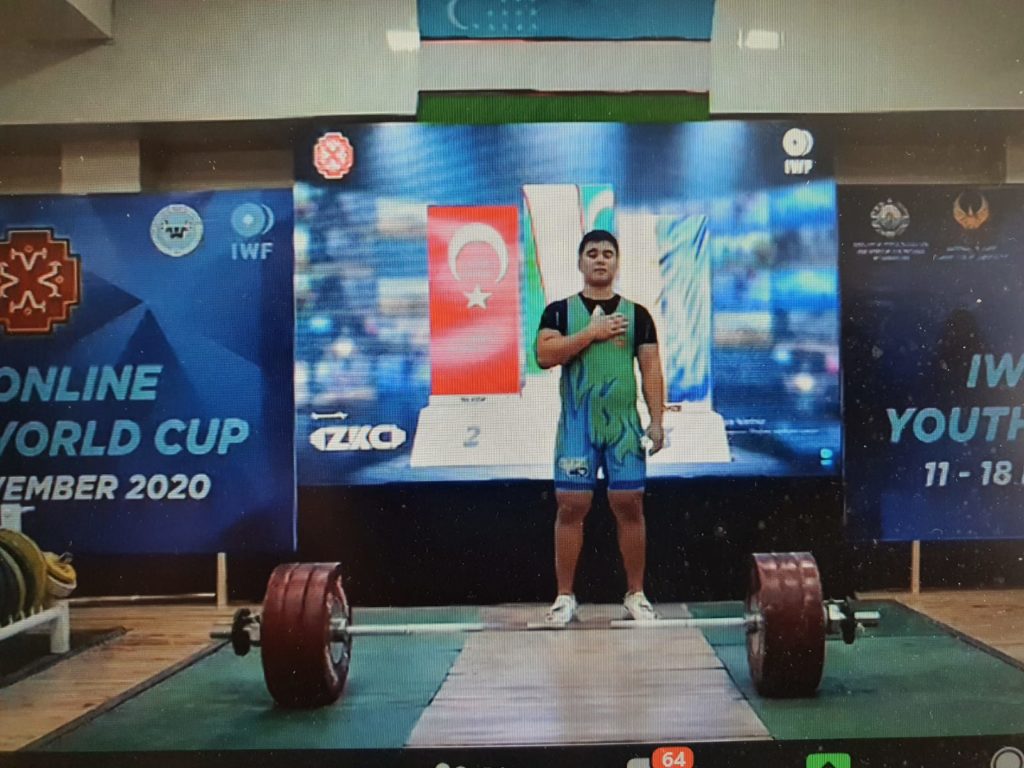
By Nancy Gillen |
There has not been a lot of opportunity for new experiences this year, given much of the world’s population has spent the majority of 2020 living under restrictive measures.
Despite this, I found myself doing something novel this week. Along with my colleague Michael Houston, I anchored a Live Blog of the International Weightlifting Federation (IWF) Online Youth World Cup.
As the title suggests, the event was held virtually and streamed on YouTube. IWF officials welcomed viewers and explained the rules of the competition, before the stream cut to weightlifters around the world performing their lifts. As a result, spectators were transported to the Oceanic island nation of Nauru, the Central Asian countries of Kazakhstan and Uzbekistan, and a range of locations around Europe. In total, 400 athletes from 61 countries competed.
This sounds like a logistical nightmare and the event must have indeed required extensive levels of organisation to pull off. It all went smoothly, however, bar a few incidents where an athlete’s lift was not shown due to issues with an internet connection.
Regardless, the IWF Online Youth World Cup displayed an impressive adaptation to the “new normal”. International competition featuring athletes from around the globe is likely to be impossible for months to come, and such virtual events are the perfect solution.
Of course, online events are nothing new in 2020. Everything is now being held on a digital platform, whether that is an International Olympic Committee Session, various General Assemblies, press conferences, or indeed sport itself. Other examples of online sporting contests include the Virtual Indoor Archery World Series, starting today, or the World Athletics Ultimate Garden Clash.
It begs the question – will virtual sporting events stick around once the COVID-19 pandemic is over?
The IWF Online Youth World Cup was held in place of the IWF Youth World Championships, due to be staged in the Peruvian capital of Lima. It would be interesting to know how much money was saved by organisers by hosting the event virtually, although it is likely money was lost as a result of the cancellation of the in-person competition. If starting from scratch, however, would the online contest have been more cost-efficient?
In addition, at a time when sport is desperately trying to become more environmentally friendly, the absence of the thousands of air miles racked up by the hundreds of athletes was another positive of the online event.
Indeed, the continuation of holding sporting events virtually, even when COVID-19 is long gone, could provide a solution to some of sport’s biggest headaches. This includes the saving of money and resources and the reduction of sport’s carbon footprint. It would also eradicate the convoluted process of finding a host city and prevent the construction of unnecessary infrastructure used solely for the event and then nothing else.
Of course, virtual events only really work for certain sports. It worked so well for the IWF Online Youth World Cup because weightlifting is an individual activity and does not require too much equipment. The same could be said of archery, shooting or trampolining. There are sports which clearly would not work in a virtual setting, however, such as any team or combat sport.
In addition, holding a sporting event may cost money but it also brings cash into a host city. Spectators and athletes book hotel rooms in the area and spend money in the local shops and restaurants. Tourism has been hit hard by the COVID-19 pandemic, and sport may be used as a way of revitalising the industry once the global health crisis has ended. It is unlikely that this opportunity would be passed up to hold an event virtually instead.
Then there are the logistical issues, such as the difficulty in ensuring that every athlete is complying with anti-doping standards. There may be more scope for cheating when athletes are not in an official competition setting. World records set during an online contest are unlikely to be verified, causing frustration for the athlete who has achieved the feat.
Perhaps virtual events could be reserved for junior and youth competitions, which do not draw quite as much attention anyway. In-person contests are probably invaluable for the development of young athletes, however, and are the pinnacle of months of sacrifice and hard work. There would surely be less motivation to put the necessary effort in for a virtual event, and any victory may feel less rewarding.
Finally, and perhaps most importantly, watching or contesting an in-person sporting event is simply more enjoyable. Watching the action unfold on a screen is just not the same, and I am sure athletes feel the same as they compete in front of a camera with no crowd around them.
This is not to say that virtual events should never be used again, and they do provide a solution to some of the aforementioned issues in sport. They just do not give the buzz of live-action sport, and so will never be a permanent replacement.
Republished with permission from insidethegames.biz.